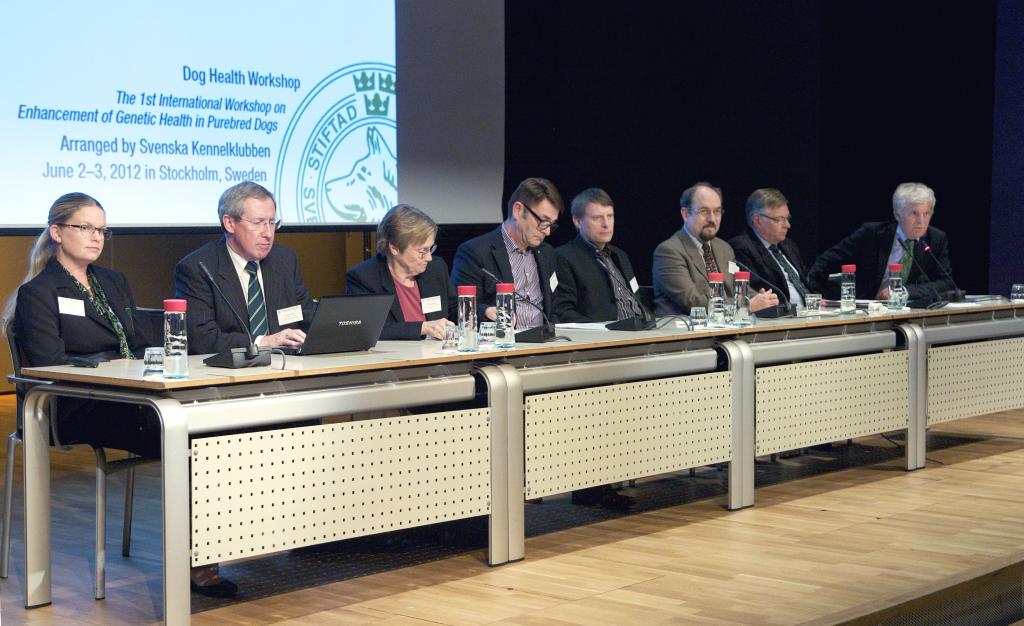The Swedish Kennel Club managed to gather 140 participants from 20 countries at
the 1st International Workshop on Enhancement of Genetic Health in Purebred Dogs
in Stockholm during the first week-end of June.
The attendees represented a wide variety of competences to handle key issues related
to the enhancement of canine genetic health.
Almost one third of the participants (mostly researchers in the expanding field
of canine genetics) also attended the 6th International Conference on Advances in
Canine and Feline Genomics and Inherited Diseases during the week before, thereby
bringing top science news and competence into the discussions of several issues
related to canine genetic health.
The cynological “world” was well represented by the FCI Board and its Breeding,
Standards and Scientific commissions and the presidents of several European kennel
clubs including Professor Steve Dean as Chairman of the KC (UK). Among numerous
veterinarians, the OFA foundation and the AKC Canine Health Foundation were well
represented by their board. Also Swedish and international welfare organisations
were there.


From left to right Sofia Malm, Steve Dean, Patricia Olson, Kari Järvinen, Peter Friedrich, Urs Giger, Ulf Uddman and Åke Hedhammar
Nils-Erik Åhmansson, president of the Swedish Kennel Club (SKK) opened the workshop
by stressing how essential it is now to pay attention to the collaborative efforts
and activities on issues related to breeding of dogs that have been brought to attention
and raised an awareness and concern among many stakeholders (i.e. judges, breeders,
veterinarians and geneticists).
After short introductory talks, the participants were divided in smaller groups
working together on various key issues with relevance for an improvement of canine
genetic health.
Mrs Renee Sporre Willes, president of the FCI standard commission and an all-breed
judge, introduced the issue on how to manage an increasing number of requests for
international recognition of breeds. A discussion on the topic was then led and
summarised by Dr Astrid Indrebø, president of the FCI Breeding commission, veterinarian,
breeder and judge of Newfoundlands.
Dr Göran Bodegård, board member of SKK, all-breed judge and the key person in the
promotion of breed-specific instructions (BSI) for show judges on how to handle
exaggerated anatomical features introduced this issue in a very illustrative presentation.
Professor Zeev Trainin, president of FCI Scientific commission, veterinarian and
show judge, led and summarised the discussion.
Five more issues (on Harmonisation of screening procedures and certifications, Validation
and utilisation of genetic tests, Development of breed-specific breeding programmes,
Selection for behavioural traits and Formation of national and international platforms
for collaborative efforts) were equally well introduced and had fruitful discussions
with contributions from e.g. David Sargan and Cathryn Mellersh (UK), Urs Giger and
Jerold Bell (US), Richard Nap (Argentine) and Claire Wade (Australia).
At the summing up sessions, chaired by Dr Patricia Olson, Chief Veterinary Advisor
for the American Humane Association and Professor Steve Dean, chairman of the Kennel
Club (UK), several points worth to carry on further were indicated. For example,
the need for a web-based platform for exchange of information between stakeholders
on an international basis was emphasised. Dr Brenda Bonnett in her introductory
talk on this issue had outlined something in that direction.
All participants were encouraged to take the responsibility for further development
and implementation of the issues dealt with at the workshop. On the webpage
www.doghealthworkshop.com
further information and as well as the presentations will appear when edited.
Finally, Professor Peter Friedrich, President of the VDH, the German Kennel Club
welcomed all to the 2nd International Workshop on Enhancement of Genetic Health in
Purebred Dogs, to be arranged in Düsseldorf on May 31st and June 1st 2014.
It is our hope that this workshop will generate initiatives and activities to handle
issues related to breeding of dogs that have been brought to attention and raised
awareness of. It is now time for collaborative actions.
Professor Åke Hedhammar is veterinarian with focus on research and training of veterinarians
in how to manage complex diseases also prevalent in humans. He has been serving
as scientific and veterinary consultant for the Swedish Kennel Club since 1978 and
is a long-standing member of the FCI Scientific commission. He has been breeding
boxers and he is a trainer and judge for working trials. Åke Hedhammar is, together
with Dr Sofia Malm, a full-time employed geneticist by the Swedish Kennel Club.
Both are the initiators of and invitors to the workshop.
Åke Hedhammar